Last week I published an article that proposed a new way to explain the Fediverse to people not familiar with it using… food analogies:

An excerpt:
I have come to see the Fediverse as the equivalent of organic, plant based, home-cooked meals and by contrast I see TikTok, Instagram, X, Threads, Snap and other platforms by Big Tech as the equivalent of Big Food – brands like Coca Cola, McDonalds, Nestlé, that promote ultra-processed, highly addictive foods and beverages, contributing to an epidemic of obesity, type 2 diabetes and other diet-related diseases.
You may be tempted to think Bluesky fits the “home-cooked” description because of its promise of decentralization.
I’m cutting to the chase and revealing my theory up front: I actually think Bluesky is just like the "Impossible Burger" – a plant-based burger patty engineered to taste like a real meat-based burger.
The Impossible Burger on paper:
– great for the environment and "delicious"
– trendy, as it enjoyed incredible media hype when it was first unveiled
– appealing because it replicates a taste many are already familiar with.
In reality the Impossible Burger is another highly processed food product that is not healthy if consumed on a daily basis.
Similarly, Bluesky is being hailed as revolutionary, the next generation of social media with custom feeds and stackable moderation. It’s being touted as decentralized, where people can control their data and identities and move them elsewhere should a hostile owner take over. Bluesky is currently enjoying incredible media hype, with coverage in mainstream media outlets the world over and media organizations moving to it en masse. In reality Bluesky is a network with centralized architecture that makes moving impossibly difficult. And centralization aside, Bluesky still has the same addictive features of X and other text-based social platforms.
But let's backtrack. What is Bluesky and why is it so popular?
Bluesky is the cool new kid
Bluesky is a social network created in 2019, spawned from Twitter (now X) in 2021. It is based on the AT Protocol with a composable user experience, stackable moderation and custom algorithmic feeds. Its big promise: decentralization, or: the ability to fully own one’s data and move to a different server, if a user so chooses. Let’s emphasize the word “promise” because as we’ll see later, this is a mirage.
Bluesky’s user base has ballooned since the outcome of the 2024 US Presidential election was announced. Because of Elon Musk’s ties to the Trump administration, scores of users have recently deleted their X (former Twitter) accounts and designated Bluesky as its natural successor.
Bluesky: a personal perspective
Lest you think I am discussing a subject I am not familiar with, you should know that I joined Bluesky in April 2023 – back when scoring an invite for the network was extremely difficult.
The user base when I joined was around 30,000 members; the current number at the time of writing - late November 2024 - is 22.9 million.
I used Bluesky on a daily basis for months and I was there to witness the first “hellthread”. Like others, I rejoiced when AOC joined. I used Bluesky in tandem with Mastodon for the greater part of 2023; I was actually more often on Bluesky than on the Fediverse.
At the start of 2024 I made the decision to go “all in” on the Fediverse, as I sensed it would be the safer choice as a truly decentralized online space. I am glad I did.
The impact of centralization
I am not a developer or a highly technical person (not yet, ha!). That said, during my time on the Fediverse I’ve discovered highly skilled people in this space – decentralized social media – and I am thankful for all the enlightening posts they have shared, helping me form my opinions.
I have had a hunch that Bluesky was yet another centralized network for over a year. Recent writings on the topic – by people like Christine Lemmer-Webber and Jonny – have only confirmed my suspicion.
Why all this talk of centralization? Why is this an issue worth thinking about?
In the words of Cory Doctorow - who wrote about this topic recently:
I will never again devote my energies to building up an audience on a platform whose management can sever my relationship to that audience at will:
https://pluralistic.net/2023/08/06/fool-me-twice-we-dont-get-fooled-again/
When a platform can hold the people you care about or rely upon hostage – when it can credibly threaten you with disconnection and exile – that platform can abuse you in lots of ways without losing your business. In other words, they can enshittify their service.

Bluesky = Impossible Burger
When the Impossible Burger first entered the market in the mid 2010s, I remember reading scores of articles about this revolutionary invention that could help the environment - and people’s diets.
Marketing around the Impossible Burger emphasized sustainability: the environment could benefit from a plant-based burger because of reduced water usage, lower greenhouse gas emissions and decreased land use – compared to traditional meat production.
Promotional material about the burger also discussed the health benefits of consuming a plant-based burger, which meant the avoidance of cholesterol and saturated fats (which are common in traditional burgers).
I’ve been a vegetarian all my life and I have never been tempted to try an Impossible Burger. Why? Vegetarian values aside – which I’m not going into here, as I wouldn’t want to sound pedantic and I’m not trying to convert anyone – I am genuinely turned off by a highly processed product. All the cooking I do is from fresh, whole foods.
As Emily Gelsomin (senior clinical nutrition specialist at Massachusetts General Hospital) wrote on Harvard Medical School's blog:
Even though legumes are sourced for protein in the branded meatless options, their health benefits are somewhat blunted by the high degree of processing involved.
Just like it’s not advisable to take health advice from a regular person (me), but it is best to listen to doctors and nutritionists, we should listen to what prominent engineers and developers say about Bluesky.
Expert Analysis of Bluesky
The most exhaustive expert analysis and critique of Bluesky was penned recently by Christine Lemmer-Webber - one of the co-authors of the ActivityPub protocol. It’s a superb read:

Some of the elements that stood out to me:
Issue no.1: The false promise of decentralization or: running your own ATProto relay requires ENORMOUS resources
Christine Lemmer-Webber wrote:
In July 2024, running a Relay on ATProto already required 1 terabyte of storage. But more alarmingly, just a four months later in November 2024, running a relay now requires approximately 5 terabytes of storage. That is a nearly 5x increase in just four months, and my guess is that by next month, we'll see that doubled to at least ten terabytes due to the massive switchover to Bluesky which has happened post-election. As Bluesky grows in popularity, so does the rate of growth of the expected resources to host a meaningfully participating node.
Christine used a powerful metaphor to make readers understand the architectural challenges of Bluesky (vs. the Fediverse):
The physical world equivalent for a fully decentralized fediverse then is that every user sends mail to every other user's house, as needed, similar to how sending letters works in the physical world. This is decidedly not the case with a fully decentralized ATProto. The physical world equivalent would be that every user had their own house at which they stored a copy of every piece of mail delivered to every other user at their house.
(I gasped when I read this).
Issue no.2: a warning: everything is public on Bluesky
Earlier this week one of my toots about Bluesky got a lot of shocked responses on Mastodon. I wrote:
A PSA for people active on #Bluesky: your block list is PUBLIC information. A website that tracks Bluesky stats – which I am not naming here on purpose – makes this job super easy: you can enter any username and see the accounts a user has blocked. (Yes I tested it with my account and was horrified). I'm alarmed by this because the information could be weaponized for abuse. Muting may be the safer choice then? Please read up about Bluesky here: dustycloud.org/blog/how-decent… (by @cwebber)
The toot received over 800 boosts and dozens of appalled responses (with the rare cheeky answer by someone saying they were proud of their blocklist).
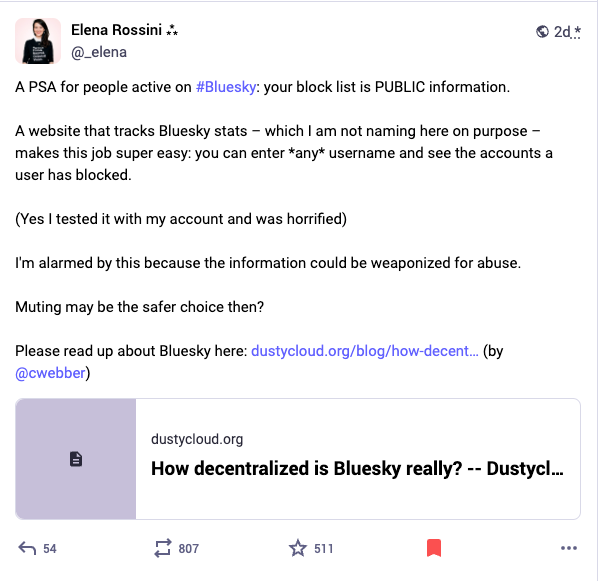
Interestingly, I posted the very same message on Bluesky the same day and received… 13 likes, 13 reposts and 3 responses.
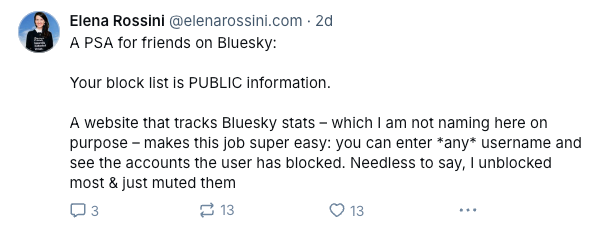
I get it though. I love coffee so much, there are no articles my parents could send me (and my oh my, do they really try) about the side effects of coffee to persuade me to stop drinking it or cut back on my daily espressos.
Bluesky users are so enthusiastic about the network – as an alternative to X and Threads – that they are willing to keep their heads in the sand and disregard any critical information about its drawbacks.
Issue no.3: Algorithms are still king on Bluesky
The very low number of reactions to my post on Bluesky revealed something else: that its users are still heavily reliant on algorithmic feeds to consume content. I find it hard to believe that a post with such important information, sent to 800 followers, would have had just 2 likes for most of the day (with the number climbing up to and maxing out at 13).
I find it crass to talk about “engagement” so apologies for mentioning numbers. I have been trying to make a point, supported by data: I find the Fediverse empowering because people are finally reading my posts (especially my articles for The Future is Federated) and are interacting with me, sending me thoughtful feedback. This goes both ways: I have found inspiring people on the Fediverse and I love that I can easily follow what they post and interact with them.
Why is this happening on the Fediverse? The answer is easy: chronological feeds.
This means that my followers can easily notice and read what I write. There are no algorithms to downrank my posts if they contain external links (which happens on X and Threads) or that would privilege posts that are engagement bait (Bluesky). I had higher engagement on my articles on Mastodon back when I had 400 followers... than I did most of the time I was on Twitter 1.0 (where I had 25,000 followers across 3 accounts). Chronological feeds make all the difference. I finally feel seen, heard and valued.
And, more importantly, Mastodon's superb web client Phanpy (created by Chee Aun) allows me to catch up on all the posts I missed by my favorite people - by simply clicking on their profile photos and seeing their posts in chronological order. The genuine connections I have built on the Fediverse are an incredible gift.
Cory Doctorow - mentioned earlier - said that he would never invest his energy building an audience in a place that could cut his ties to that audience. I wholeheartedly agree and I would add something else: I will never again invest time in building a community on a social platform ruled by algorithms.
On that note, this reply by Raptor really resonated with me:
I kinda hate how everyone keeps screaming about how many fewer people mastodon has. Sure it's not as big, but you say something here and it actually starts a conversation. Twitter, threads, bluesky? They're all just platforms for farming fake internet points (likes) off shouting to the void and hoping the algorithm likes you. People like them for the same reason old people sit at slots staring at flashing lights telling them "you're a winner!" as it bankrupts them slowly.
Issue no.4: Follow the money
Bluesky recently secured a series A funding round of 15 million dollars by Blockchain Capital – aka crypto bros. No need for further elaboration except, maybe, this toot by Daniel Supernault (creator of Pixelfed, Loops and FediDB):
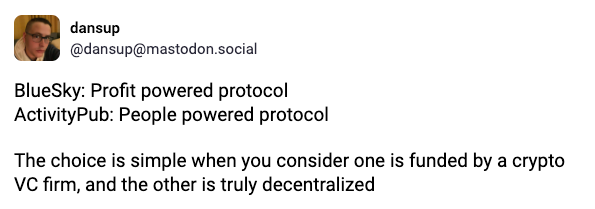
What Bluesky does well and that the Fediverse could imitate
I am sticking to the Fediverse. It may not be perfect, but I see it as the most ethical, sustainable solution out there for social networking, the best place to build genuine connections and feel seen, heard and valued.
Now, one great advantage of Bluesky over the Fediverse is that it welcomed with open arms - and created a safe space for – Black Twitter. I am a white woman and thus I have not personally experienced racist abuse in the Fediverse, but I hear it’s a problem driving POC away.
This is unacceptable.
One of my future posts for The Future is Federated will cover this very issue: how can the Fediverse become a more welcoming place for people of color and what can all of us do to be better allies?
On a far less serious note, something else that Bluesky should be commended for is the creation of “Starter Packs” – curated invite lists to help people quickly follow interesting accounts on the platform, based on a theme a user selects (“Friends” or “People in Tech” or “Blacksky” for example). Bluesky Starter Packs have been so successful in onboarding new users that Meta’s Threads plans to copy this feature.
Now one of the great oversights in Bluesky's creation of Starter Packs is that a user cannot consent - or deny - being added to one. In addition, there are no notifications when someone on Bluesky is being added to a Starter Pack (which could potentially lead to harassment). Daniel Supernault is currently working on "Starter Kits" for the Fediverse that would fix this problem, requiring consent:
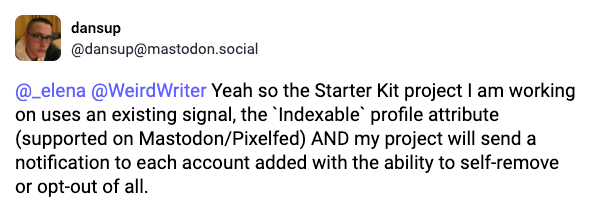
Migrations
I actually think it’s a good thing that the X-odus (exodus from X) resulted in the mass deletion of X accounts with millions of people moving to Bluesky.
Why? Because I wouldn’t want tens of millions of new people suddenly landing in the Fediverse and changing its culture.
The culture of the Fediverse is my favorite thing about it: the lack of engagement bait and thirst traps, the respect of privacy (of children especially), the frequent use of alt text, which makes images accessible for people with visual impairements. (If you are interested in earlier posts I wrote about the values of the Fediverse, here is Part 1 and Part 2).
Let’s continue with the food analogy because it works perfectly in this case, too.
Imagine the social media world as a giant food court. The biggest, most popular areas are the fast food stands – McDonalds, Starbucks, Taco Bell, Chipotle, KFC, Panera, Panda Express – selling essentially junk food and beverages engineered to be irresistibly delicious and addictive. This is your TikTok, Instagram, Facebook, X and Snap - incredibly popular but not that healthy if consumed regularly and in great quantities.
In a small corner of this giant food court you have stands from farmers’ markets selling home-made meals made out of fresh ingredients, low on sodium and sugar, with no additives. This is the Fediverse.
Imagine seeing a mass migration of people from the huge fast food section to the small, organic home-made section. What would they do? Complain that the homemade organic food tastes like “cardboard” because their palates have been trained on a diet of junk food for TWO DECADES. They would say that the sautéed broccoli is disgusting. They would turn their noses at the sight of tofu and not even try it.
Regulars in the organic, homemade food section would certainly be annoyed by the massive influx of new people constantly complaining that natural food has “no taste.”
Let them go to the new section first: the “Impossible Food” section (aka Bluesky). Moving away from X is a good first step. Now, Fediverse advocates who would like to see more diversity here could be active on Bluesky, gently educating people about the advantages of the Fediverse. That’s what I am planning to do: convincing people one by one to try the Fediverse.
Paraphrasing a toot by Bill Hooker: “let the Fediverse grow slowly.” So that we won’t have an Eternal September all over again.
As always, thanks for being here.
Elena
P.S.: You can find all the previous articles in this series here:
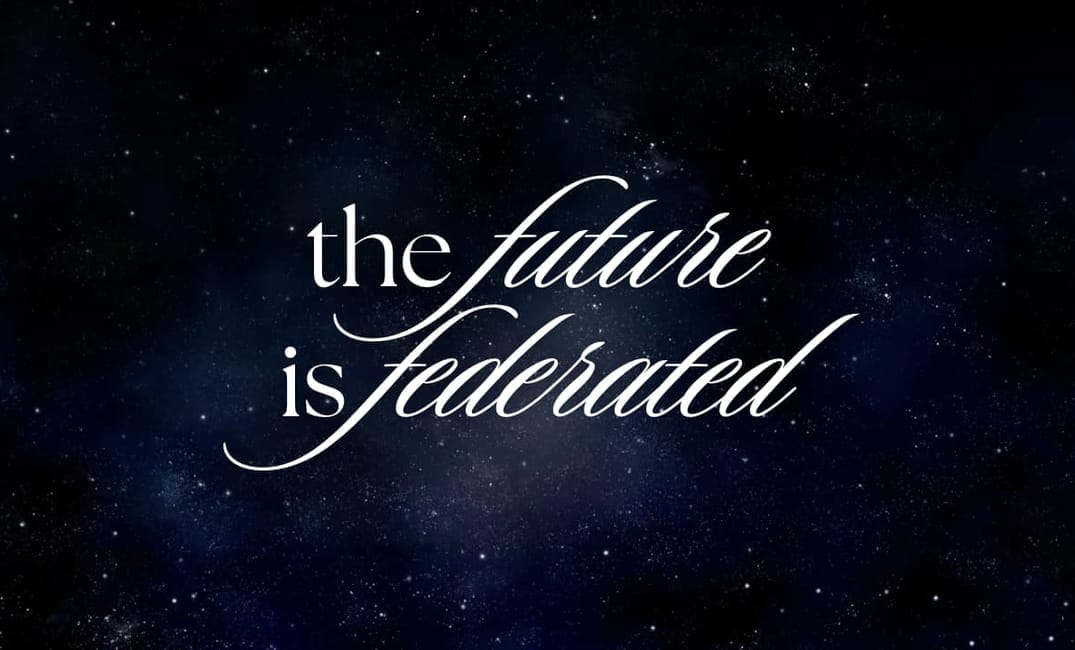
A note: the post was updated on Friday, November 29th to adjust and clarify some statements about the "culture of the Fediverse" and to add an update about Fediverse "Starter Kits" by Daniel Supernault.
The cover image uses a photo by Jelleke Vanooteghem (via Unsplash)
💓 Did you enjoy this post? Share it with a friend!
👫 Follow me on Mastodon (my favorite network!) or Pixelfed. All my other links are available here: elena.social
📽️ If you'd like to support my work, you could buy or rent my documentary The Illusionists on the globalization of beauty. Watch the teaser:

💌 If you'd like to say hi, my contact information is here
✏️ If this post resonated with you, leave a comment!





